Religion and language of the people of Dubai
Religion and language are among the key factors that shape the culture and society of Dubai. Dubai, one of the emirates of the United Arab Emirates, has a predominantly Muslim population due to its geographic location in the Middle East, and Islam is an integral part of daily life in the city.
Islam influences not only religious matters but also social customs, religious rituals, and even the laws of Dubai. In addition, as a global city, Dubai welcomes people from various countries with diverse religions, so there are minorities of Christians, Hindus, and other religions living in the city.
The official language of the people of Dubai is Arabic, and this language is used in official communications, education, and government affairs. However, due to the large presence of immigrants from around the world, Dubai has become a multilingual city. English is widely spoken in Dubai and is considered the second language, especially in business, commerce, and public services.
These linguistic features make Dubai a multicultural city where people from different cultures and languages live together harmoniously. In this article, we will explore the religion and language of the people of Dubai and analyze their role in shaping the society and culture of this dynamic and modern city.
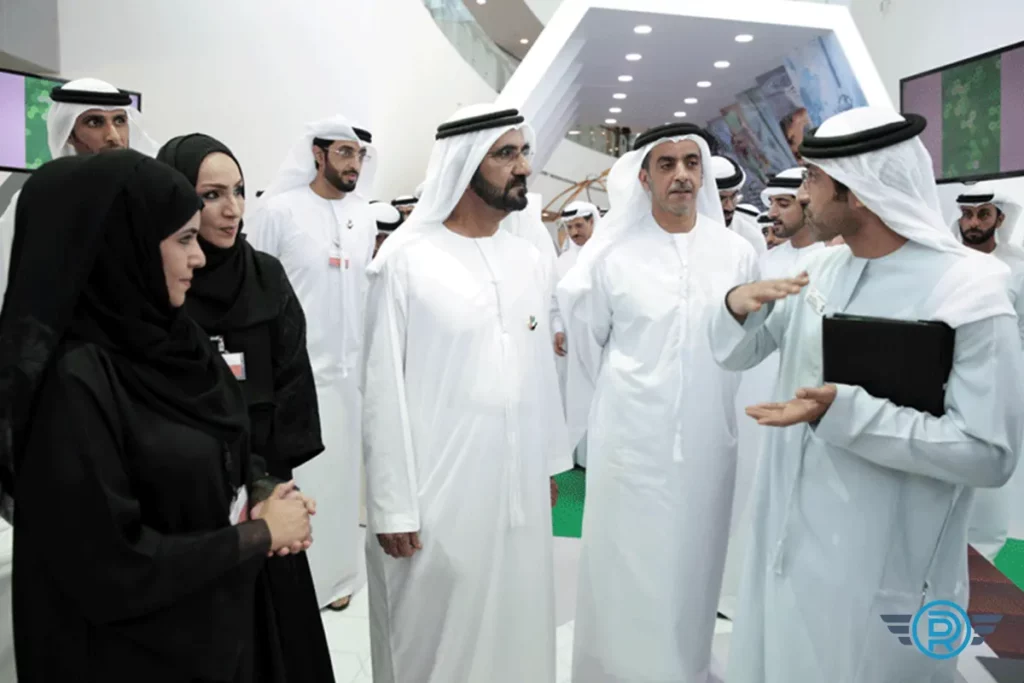
The language of the people of Dubai
Dubai is a modern and international city in the United Arab Emirates that, despite its rapid development, has preserved its cultural and religious roots. In this city, religion and language play a significant role in shaping social identity. The official language of the people of Dubai is Arabic, and their official religion is Islam. These two elements are reflected in many aspects of daily life, education, laws, and even the city’s architecture.
Although Arabic is the official language, English is also widely spoken due to the large presence of expatriates from different countries. Most signs, announcements, and everyday conversations in commercial and tourist areas are conducted in English. In fact, many Dubai residents—especially migrants—use English as their main means of communication.
Other languages such as Urdu, Hindi, Farsi, and Chinese can also be heard in parts of the city. This linguistic diversity is due to the high number of immigrants from Asia and other parts of the world who have come to Dubai for work and life.
Religiously, Islam has a strong influence on laws, public holidays, and lifestyle. At the same time, Dubai is an open and multicultural city. Followers of other religions such as Christianity, Hinduism, and Buddhism also live in this city and are allowed to practice their religious ceremonies.
The combination of religion and language in Dubai is a clear example of the coexistence of tradition and modernity—where Islamic identity blends with diverse cultures to shape a vibrant and global city.
Diyar Rent, the leading provider of chauffeured car rental services in Dubai, delivers a luxurious and unparalleled experience for you. With modern vehicles and professional drivers, enjoy your business and leisure trips with complete comfort and peace of mind.
Most common languages in Dubai
Despite Arabic being the official language, English is one of the most widely used languages in Dubai. Most residents, especially expatriates, use English for daily communication. Street signs, administrative forms, restaurant menus, and advertisements are commonly written in both Arabic and English.
In addition to Arabic and English, Urdu and Hindi are also widely spoken in Dubai due to the large population of immigrants from India and Pakistan, who make up a significant portion of the city’s workforce. Persian (Farsi) can also be heard in some neighborhoods, as there is a notable Iranian community living in Dubai.
This linguistic diversity is matched by religious diversity. While Islam is the official religion and has a strong influence on the laws, culture, and daily life, Dubai is an open and multicultural city. Followers of other religions such as Christianity, Hinduism, Buddhism, and others live freely in the city and are allowed to practice their religious ceremonies.
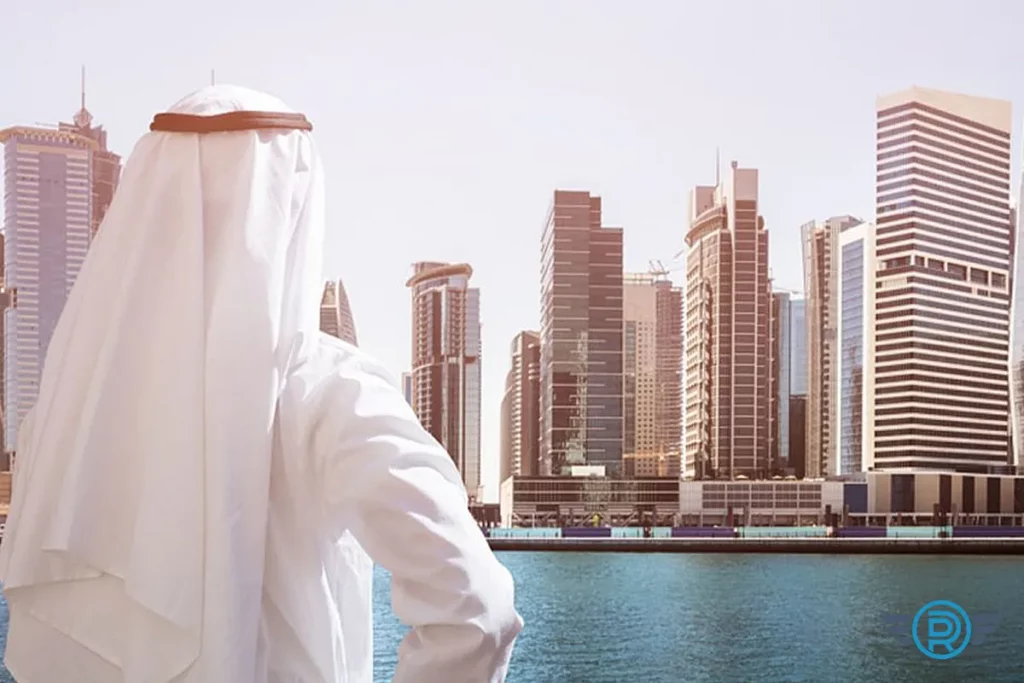
The religion of the people of Dubai
Islam is the official religion of the people of Dubai, and most native citizens follow the Sunni sect. This religious belief has a significant impact on the city’s laws, customs, education system, and even urban planning.
Prayer, Ramadan, Eid al-Fitr, and Eid al-Adha are among the most important religious occasions in Dubai, and many social regulations—such as office working hours during Ramadan—are organized based on Islamic principles. In addition, numerous mosques have been built throughout the city to facilitate prayer, forming an essential part of Muslims’ daily lives.
However, Dubai is an international city with a diverse population, and people from many different cultures and religions live there. Therefore, alongside Islam, followers of Christianity, Hinduism, Buddhism, Sikhism, and other religions are also present in the city. For them, places of worship such as churches, temples, and gurdwaras have been designated.
In addition to religious diversity, Dubai is also linguistically diverse. Although Arabic is the official language, due to widespread immigration, English plays a major role in daily communication. Languages such as Urdu, Hindi, Persian, and Chinese can also be heard in various neighborhoods.
In terms of religion, freedom of worship is respected within the framework of the country’s laws. Non-Muslims are allowed to hold their religious ceremonies in designated places, provided they follow public laws and do not cause disturbance to others. This open approach has made Dubai a safe and attractive city for immigrants of various faiths.
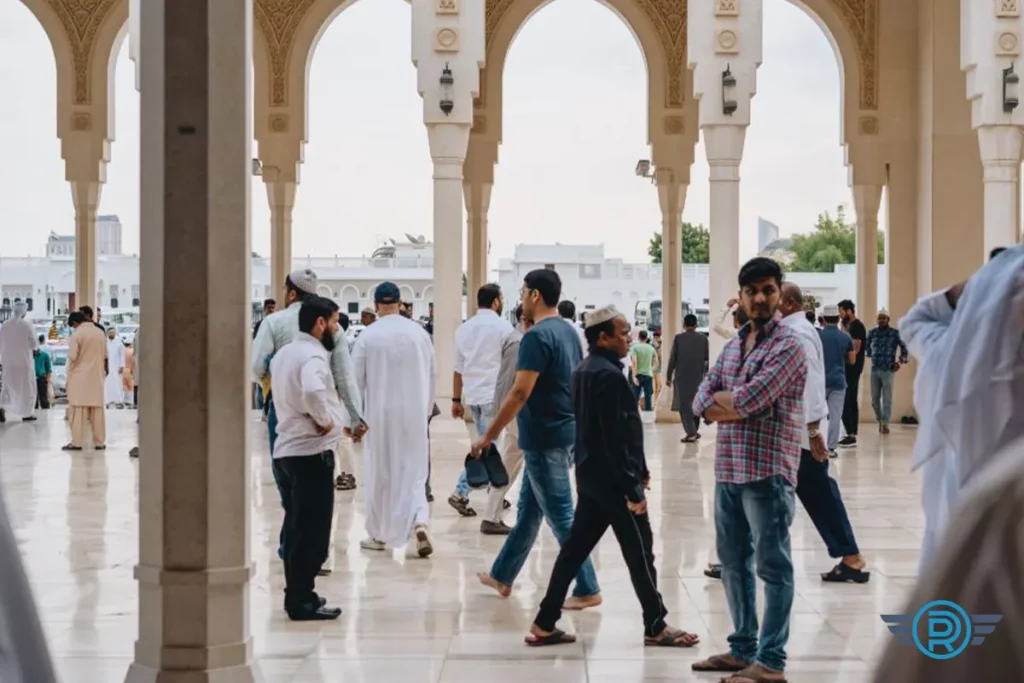
Moreover, Dubai’s linguistic diversity has become one of its defining features. The government has made efforts to preserve Arabic as the official language while also incorporating other widely spoken languages into public services, signage, and advertisements. As a result, even those who do not speak Arabic can easily live and work in the city.
This combination of respect for religion and linguistic diversity has made Dubai not only a commercial and tourist hub but also a model of cultural and religious coexistence. In Dubai, Islam remains the cultural foundation, but alongside it, the religious and linguistic diversity creates an environment of understanding and shared living.
The situation of women in Dubai
Women in Dubai, contrary to many outdated perceptions about Arab societies, enjoy a significant status in society. Although the official religion and language—Islam and Arabic—play a key role in shaping the country’s laws and social structures, they have not hindered the progress and social, educational, or economic activities of women in Dubai.
Emirati women, as well as expatriates living in Dubai, are active in various fields such as education, healthcare, commerce, technology, and even government. In recent years, women’s presence in managerial positions, international companies, and governmental institutions has increased significantly. The UAE government also supports women’s participation in the country’s development through special programs and legislation.
In terms of education, the literacy rate among women is very high, and many are enrolled in universities. Emirati women have made remarkable progress in fields such as engineering, medicine, law, and political science.
Nevertheless, religious values still play a role in the framework of women’s lives in Dubai. The hijab is commonly worn by Muslim women in formal and religious settings as part of cultural and religious identity. However, non-Muslim or foreign women are not required to wear the hijab, though modest and respectful clothing is expected in public spaces in accordance with Islamic cultural norms.
National costume of the people of Dubai
In Dubai, the traditional attire for men is called the kandura. This long, white robe, often worn during formal and everyday occasions, symbolizes simplicity and dignity, aligning with Islamic principles. In addition to the kandura, men typically wear a ghutra or agal to cover their heads. This attire not only reflects the culture and religion of the people of Dubai but also helps protect them from the region’s intense heat.
For women, the traditional dress is known as the abaya. The abaya is a long, black garment often accompanied by a niqab (headscarf). This dress is in line with the Islamic and cultural values of Dubai, adhering to the principles of modesty. Both religion and language play significant roles in the choice of these garments. Through their attire, the people of Dubai show respect for Islamic values while maintaining their cultural and religious identity in a modern society.
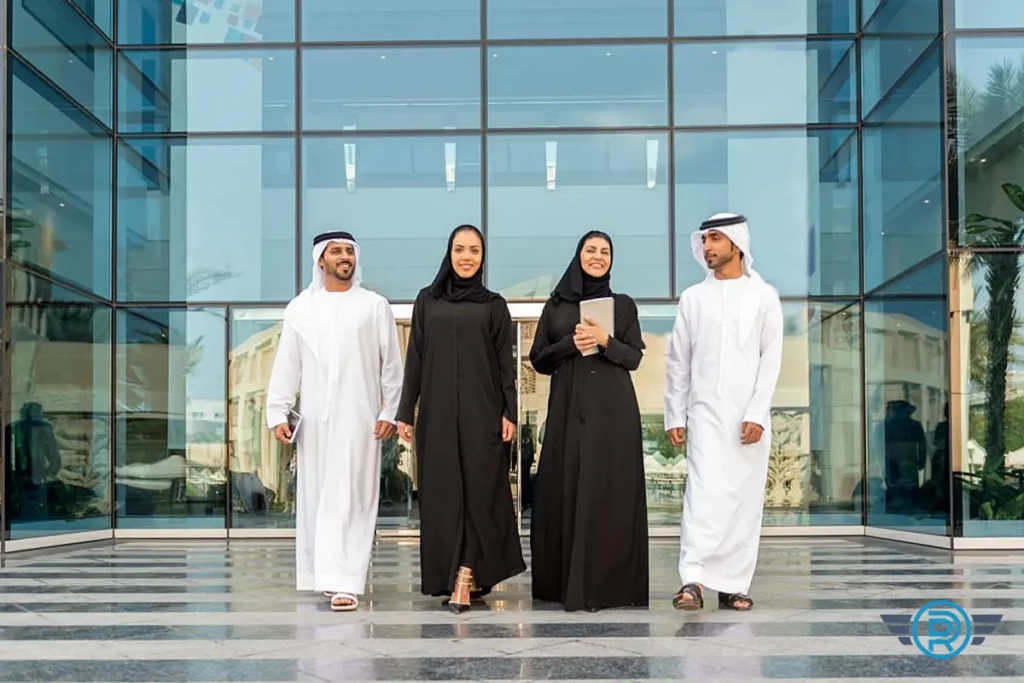
The culture of the people of Dubai
The culture of Dubai is a blend of Islamic traditions and modern global influences. As one of the leading international business and tourism hubs, the city maintains a deep commitment to its religion and language, which play a central role in shaping the lifestyle of its people. With a diverse population from all over the world, Dubai is an example of the coexistence of various cultures and religions, while Islamic values and the Arabic language still dominate.
Dubai is also known for its warm hospitality towards other cultures and religions. It is one of the few cities that allows non-Muslims to freely practice their religious rituals and hold religious ceremonies. This religious coexistence, alongside respect for Islam and the Arabic language, has made Dubai one of the most successful cities in terms of cultural and religious interaction.
Hospitality in Dubai
Hospitality is one of the most prominent and proud traditions in the culture of the people of Dubai.
Despite being a modern city with an advanced urban lifestyle, Dubai remains deeply rooted in its old and cherished traditions—one of the most important being warm hospitality toward guests. In Dubai, guests are held in high regard, and showing respect to them is an essential part of social and family etiquette.
When you are invited to an Emirati home, you are usually welcomed with Arabic coffee, dates, and traditional sweets. Arabic coffee—often referred to as the “guest’s coffee”—symbolizes respect and warmth. In this form of hospitality, it’s not just about the food or drinks, but also about friendly behavior, smiles, respect, and engaging conversations.
Even in public spaces like markets, shopping centers, and offices, people generally try to interact politely and respectfully, especially with tourists and foreigners. This attitude has its roots in the traditional Bedouin culture, where guests were considered a blessing from God.
Food culture of Dubai people
The food culture of Dubai is a blend of Arabic, Islamic, and global influences.
Although Dubai is considered a modern and multicultural city, traditional Emirati dishes still hold a special place on family tables.
The main ingredients of traditional Dubai cuisine usually include rice, meat (especially lamb and chicken), fish, and aromatic spices. One of the popular traditional dishes is Machboos, which is made with fragrant rice, meat, and spices such as cinnamon and cardamom. Another well-known dish, especially during Ramadan and religious occasions, is Harees—a hearty meal made from wheat and slow-cooked meat.
Dates and Arabic coffee play an important role in Dubai’s food culture. Dates are not only commonly consumed during religious rituals like Iftar, but they are also a symbol of hospitality. Arabic coffee, typically infused with cardamom and served without sugar in small cups, is a sign of respect and a traditional way to welcome guests.
Due to the large expatriate population in Dubai, foods from India, Iran, Lebanon, Pakistan, China, and even Europe are widely available throughout the city. This diversity has made Dubai one of the world’s most attractive destinations for food lovers.
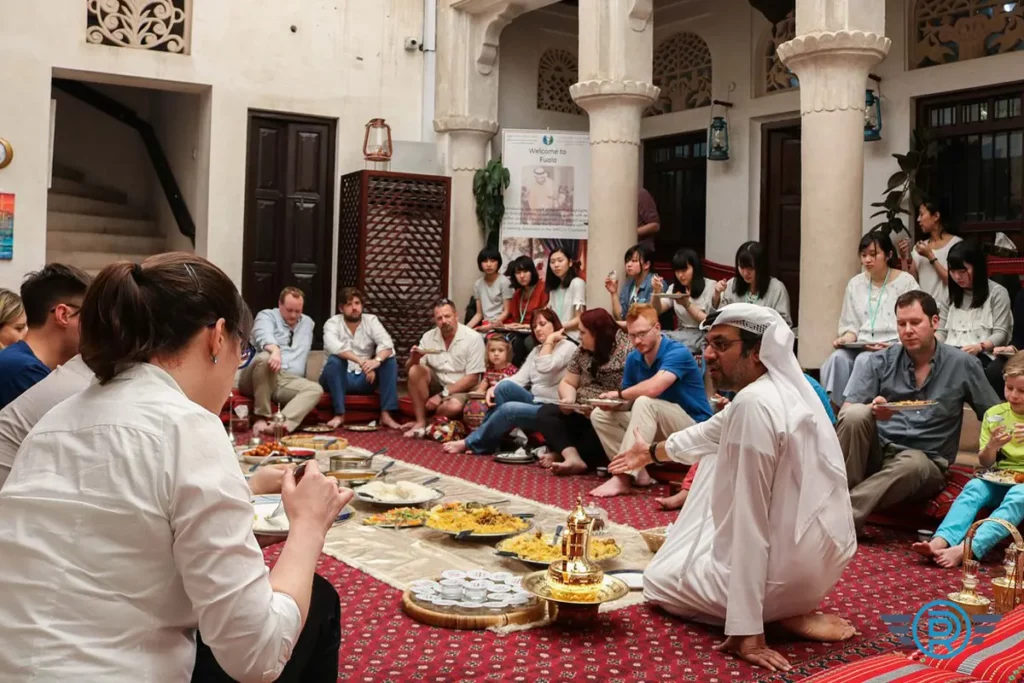
Customs and traditions of the people of Dubai
Marriage culture in Dubai, like other regions of the Middle East, is heavily influenced by Islamic values and Arab traditions. However, due to the city’s cultural diversity and its large expatriate population, marriages in Dubai take various forms and are celebrated with diverse cultural differences. Marriage in Dubai is viewed as both a social and religious contract, typically conducted with formal ceremonies and under the supervision of families.
In Emirati culture, traditional marriage still holds a special place. In these marriages, families play a significant role, and many marriages are arranged with the consent of the parents. The courtship and engagement phases are early steps in the process, where families assess whether the couple is socially, economically, and culturally compatible. Afterward, the marriage contract and wedding celebrations take place.
The Mahr (dowry) is an important part of marriage in Dubai. It is usually a financial amount given by the groom to the bride, as stipulated by Islamic tradition. This amount is determined as an agreement during the marriage contract and serves to protect the rights of the woman.
In Dubai, mixed or international marriages are also common. Due to the ethnic and religious diversity in the city, many people from different countries who have migrated to Dubai choose to marry individuals from other cultures. In such marriages, the main challenges often stem from cultural and language differences, which are resolved through dialogue and respect for each other’s beliefs and customs.
In addition to traditional marriages, Dubai, with its modern environment, also accommodates informal marriages and cohabitations without formal contracts, especially among expatriates and those from Western countries. These marriages may not be legally recognized in the country, but cohabitation is allowed in Dubai.
final word
Dubai, with its diverse cultural mix, has become a place where religious, linguistic, and cultural differences can be observed. At the same time, religion and language play a significant role in shaping the identity of the city. While maintaining its cultural and religious principles, Dubai has created an open environment that welcomes other cultures, making it one of the most important global destinations.





















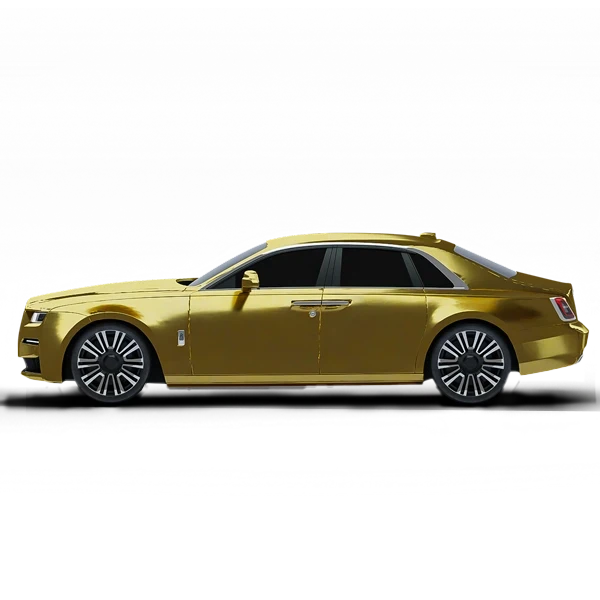



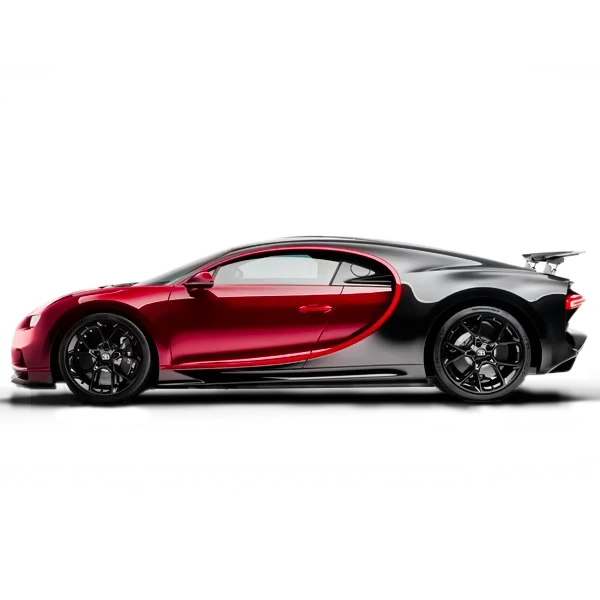



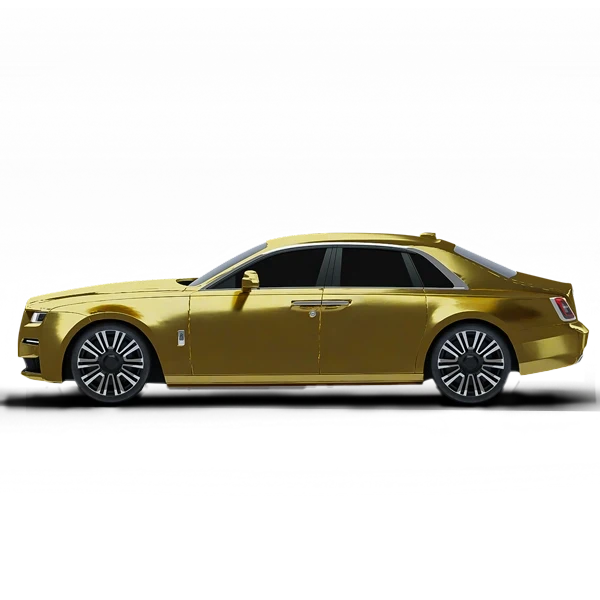






 Rolls Royce
Rolls Royce Lexus
Lexus Lamborghini
Lamborghini Porsche
Porsche Ferrari
Ferrari Toyota
Toyota Mercedes Benz
Mercedes Benz BMW
BMW Land Rover
Land Rover Bentley
Bentley Nissan
Nissan Cadillac
Cadillac Audi
Audi Chevrolet
Chevrolet GMC
GMC Hyundai
Hyundai Kia
Kia Mazda
Mazda